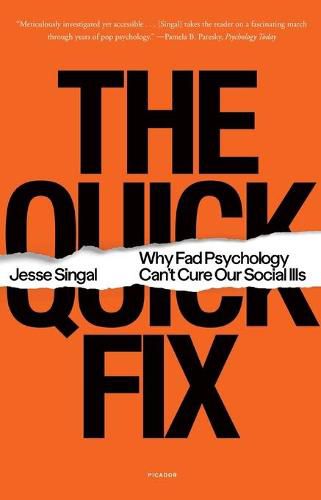Readings Newsletter
Become a Readings Member to make your shopping experience even easier.
Sign in or sign up for free!
You’re not far away from qualifying for FREE standard shipping within Australia
You’ve qualified for FREE standard shipping within Australia
The cart is loading…






An investigative journalist exposes the many holes in today’s bestselling behavioral science, and argues that the trendy, TED-Talk-friendly psychological interventions will never be enough to truly address social injustice and inequality.
Through their viral TED Talks, bestselling books, and counterintuitive remedies for complicated problems, psychologists and allied social scientists have become leading thinkers of our time. Power posing and grit, they say, can help individuals overcome entrenched inequality in schools and the workplace. Positive psychologists inspired the U.S. Army to spend hundreds of millions of dollars on an intervention geared toward preventing PTSD in its combat soldiers. The implicit association test swept the nation on the claim that it can reveal unconscious biases and reduce racism in police and human resources departments. But what if much of the science underlying these blockbuster ideas is dubious or fallacious? What if Americans’ long-standing preference for simplistic self-help platitudes is exerting a pernicious influence on the way behavioral science is communicated and even funded, leading respected academics and the media astray?
In The Quick Fix, Jesse Singal examines the most influential ideas of recent decades and the shaky science that supports them. He begins with the California legislator who introduced self-esteem into the nation’s classrooms in the 1980s and the Princeton political scientist who warned of an epidemic of youthful superpredators in the 1990s. Both much-touted ideas had little basis in reality, but a massive impact.
Then, turning to the explosive popularity of twenty-first-century social psychology, Singal examines the misleading appeal of entertaining lab results and critiques the idea that the subtle unconscious cues known as primes shape our behavior. As he shows, today’s popular behavioral science emphasizes repairing, improving, and optimizing individuals rather than understanding and confronting the larger structural forces that drive social ills. The Quick Fix is a fresh and powerful indictment of the thought leaders and influencers who cut corners as they sell the public half-baked solutions to problems that deserve more serious treatment.
$9.00 standard shipping within Australia
FREE standard shipping within Australia for orders over $100.00
Express & International shipping calculated at checkout
Stock availability can be subject to change without notice. We recommend calling the shop or contacting our online team to check availability of low stock items. Please see our Shopping Online page for more details.
An investigative journalist exposes the many holes in today’s bestselling behavioral science, and argues that the trendy, TED-Talk-friendly psychological interventions will never be enough to truly address social injustice and inequality.
Through their viral TED Talks, bestselling books, and counterintuitive remedies for complicated problems, psychologists and allied social scientists have become leading thinkers of our time. Power posing and grit, they say, can help individuals overcome entrenched inequality in schools and the workplace. Positive psychologists inspired the U.S. Army to spend hundreds of millions of dollars on an intervention geared toward preventing PTSD in its combat soldiers. The implicit association test swept the nation on the claim that it can reveal unconscious biases and reduce racism in police and human resources departments. But what if much of the science underlying these blockbuster ideas is dubious or fallacious? What if Americans’ long-standing preference for simplistic self-help platitudes is exerting a pernicious influence on the way behavioral science is communicated and even funded, leading respected academics and the media astray?
In The Quick Fix, Jesse Singal examines the most influential ideas of recent decades and the shaky science that supports them. He begins with the California legislator who introduced self-esteem into the nation’s classrooms in the 1980s and the Princeton political scientist who warned of an epidemic of youthful superpredators in the 1990s. Both much-touted ideas had little basis in reality, but a massive impact.
Then, turning to the explosive popularity of twenty-first-century social psychology, Singal examines the misleading appeal of entertaining lab results and critiques the idea that the subtle unconscious cues known as primes shape our behavior. As he shows, today’s popular behavioral science emphasizes repairing, improving, and optimizing individuals rather than understanding and confronting the larger structural forces that drive social ills. The Quick Fix is a fresh and powerful indictment of the thought leaders and influencers who cut corners as they sell the public half-baked solutions to problems that deserve more serious treatment.